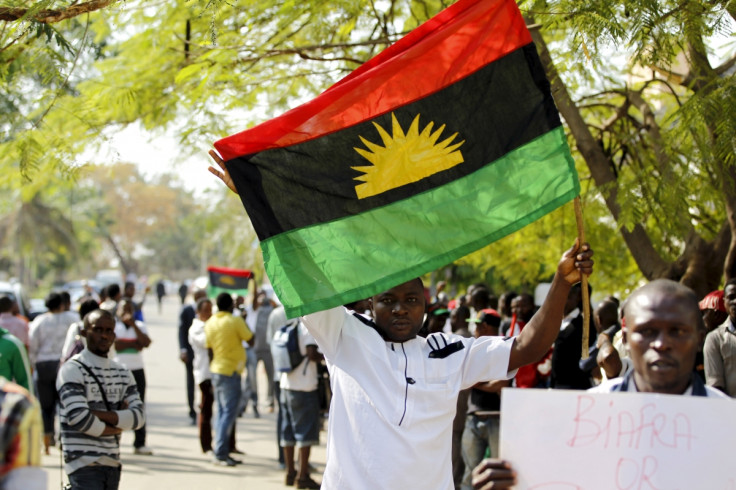Nigerian Army denies killing unarmed pro-Biafrans as Amnesty urges probe
The Nigerian army has denied allegations by a humanitarian campaign group that it killed unarmed people during celebrations to commemorate millions who died during the 1967-1970 Nigerian civil war, also known as the Biafran war. Amnesty International carried out an on-the-spot investigation at morgues and hospitals in Anambra state and claimed the Nigerian military opened fire on members of the Indigenous people of Biafra (IPOB), supporters and bystanders at three locations in Onitsha town, between 29 and 30 May 2016.
The army, however, said in a statement that Ipob members "engaged in violent protests which were featured with outright disregard for law and order", a claim Ipob strongly denies.
Colonel H.A. Gambo, deputy director for army public relations, told the Daily Post website that Amnesty's claims were misleading. "Elements of MASSOB/IPOB engaged in violent protests which were featured with outright disregard for law and order. In the scenario of anarchy that ensued, the pro-Biafran protesters who had chosen the day to mark the 50th Anniversary of Biafra perpetrated a number of unimaginable atrocities to unhinge the reign of peace, security and stability in several parts of Anambra State," he said.
Ipob claims more than 40 people were killed, but the exact death toll is unknown, partly due to the fact that security forces are believed to have taken corpses away. An Ipob coordinator who witnessed some of the alleged violence on demonstrators in Anambra, told IBTimes UK security forces used tear gas and fired shots in the air to intimidate people, who ran away. "Dead bodies in our possession are nine. The Nigerian forces took almost all the dead bodies. We tried to rescue the injured, but the shooting was too much," the coordinator said.
M.K. Ibrahim, Amnesty's director for the Nigerian branch, called for an urgent investigation into the alleged killings. "These shootings, some of which may amount to extra judicial executions, must be urgently and independently investigated and anyone suspected of criminal responsibility must be brought to justice," he said.
Nigeria's security forces have often been accused of violent acts against "unarmed" and "peaceful" pro-Biafran protesters, claims authorities strongly deny. In an exclusive report by IBTimes UK published in February, Amnesty International confirmed that Nigerian security forces had used excessive force against pro-Biafran protesters on some occasions.

Pro-Biafran movement
The Biafran territories were forcibly annexed to modern-day Nigeria during British colonisation, which ended in 1960. Following two coup d'etats and the 1966 massacres of Igbo people in northern Nigeria, the contested Biafran territories, under the leadership of military officer and politician Chukwuemeka Odumegwu Ojukwu, seceded from Nigeria and declared independence on 30 May 1967.
The Biafran Republic was re-annexed to Nigeria in 1970, but breakaway calls have continued since.
The pro-Biafran movement has gained renewed momentum following the arrest of Nnamdi Kanu, one of the leaders of the group, in October 2015. Kanu, Ipob leader and director of UK-based Radio Biafra, is standing trial on six counts of treasonable felony charges.
The Nigerian government has always maintained that Nigeria's unity was a priority for the country and that although peaceful pro-Biafran protests were welcome, demanding the breakaway of the Biafran territories went against the constitution.
Nigeria up close: Check out our Flipboard magazine
© Copyright IBTimes 2024. All rights reserved.






